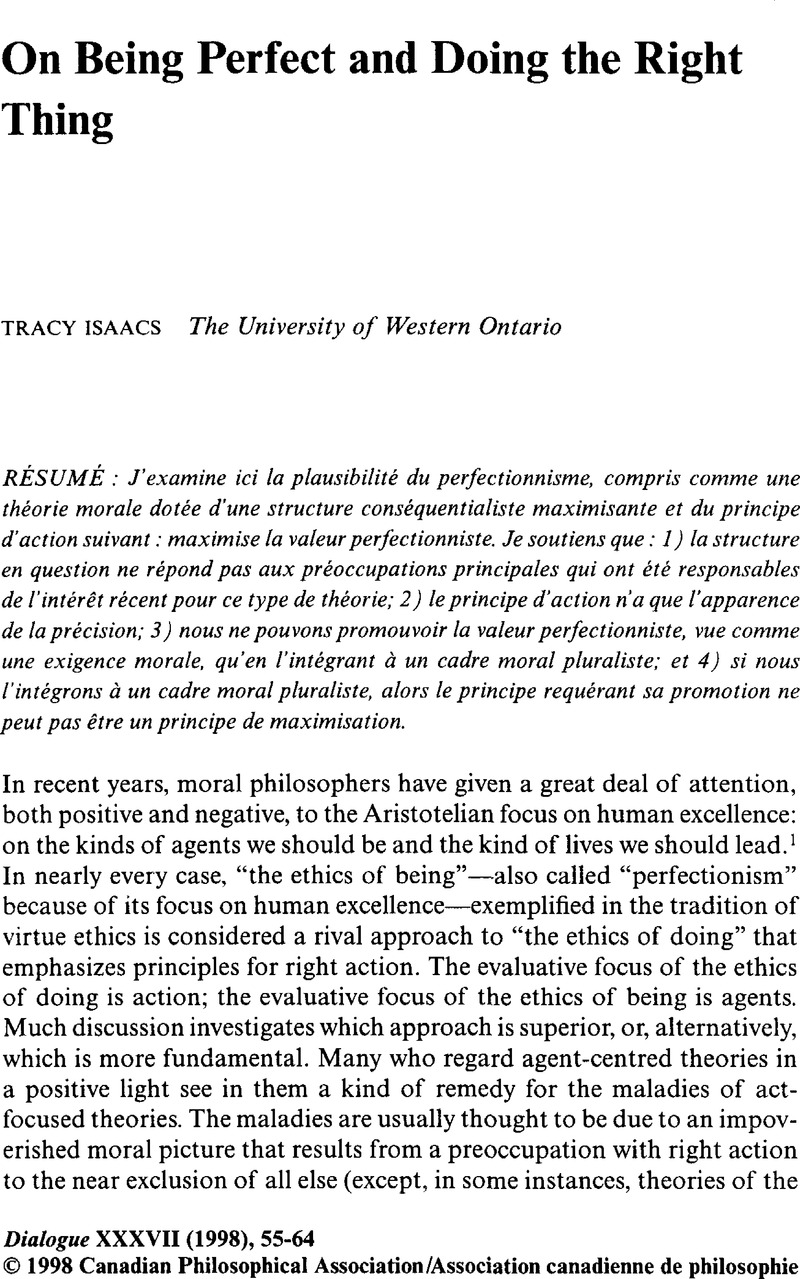No CrossRef data available.
Published online by Cambridge University Press: 13 April 2010

1 See, for example, Anscombe, Elizabeth, “Modern Moral Philosophy,” Philosophy, 33 (1958): 1–19;CrossRefGoogle Scholar reprinted in 20th Century Ethical Theory, edited by Cahn, Steven M. and Haber, Joram G. (Englewood Cliffs, NJ: Prentice Hall, 1995): 351–64;Google ScholarBecker, Lawrence, “The Neglect of Virtue,” Ethics, 85 (1975): 110–22;CrossRefGoogle ScholarFrankena, William, Ethics, 2nd ed. (Englewood Cliffs, NJ: Prentice Hall, 1973)Google Scholar; Hurka, Thomas, Perfectionism (Oxford: Oxford University Press, 1993)Google Scholar; Louden, Robert, “Some Vices of Virtue ‘Ethics,” American Philosophical Quarterly, 21 (1984): 227–36;Google ScholarMaclntyre, Alasdair, After Virtue (London: Duckworth, 1981)Google Scholar; Mayo, Bernard, Ethics and the Moral Life (London: Macmillan, 1958)Google Scholar; and Wolf, Susan, “Moral Saints,” Journal of Philosophy, 79 (1982): 419–39CrossRefGoogle Scholar.
2 See Anscombe, , “Modern Moral Philosophy”; Becker, “Neglect of Virtue”; and Wolf, “Moral Saints.”Google Scholar.
3 See Frankena, Ethics, and Louden, “Some Vices.”.
4 Hurka, , PerfectionismGoogle Scholar.
5 Ibid, chap. 3.
6 Hurka explicitly rejects “moralistic perfectionisms” that claim that the development of some essential human property such as practical reason requires “developing the dispositions commonly thought to be virtuous” (ibid., p. 19). He stresses that the best perfectionism must be free of moralism, and that “it must never characterize the good by reference to conventional moral rules, but always non-morally” (ibid., p. 20). Indeed, it is for this reason that the consequentialist structure makes so much sense to Hurka.
7 See Anscombe, “Modern Moral Philosophy.” See also Louden, Robert, Morality and Moral Theory: A Reappraisal and Reaffirmation (Oxford: Oxford University Press, 1992):CrossRefGoogle Scholar “The act-versus-agent (or doing-versus-being) debate is usually said to have begun in 1958 with Elizabeth Anscombe's advice to ‘do ethics without’ the notion of a ‘moral ought’” (p. 27).
8 Anscombe, , “Modern Moral Philosophy,” in Cahn and Haber, eds., 20th Century Ethical Theory, pp. 362–63Google Scholar.
9 Sidgwick, Henry, The Methods of Ethics, 7th ed. (Indianapolis: Hackett Publishing, 1981); originally published by Macmillan, 1907Google Scholar.
10 See Becker, , “Neglect of Virtue,” and Mayo, EthicsGoogle Scholar.
11 I will not here address her further point that “right,” “wrong,” and “ought,” are terms that have been ripped out of their proper context and are meaningless in the context of godless moral theories. See Anscombe, “Modern Moral Philosphy.”
12 Louden, , “Some Vices,” p. 229Google Scholar.
13 Ibid., p. 230.
14 Hurka, Perfectionism, gives an extensive outline of the type of value it is and the way it is to be promoted in chapters 2 to 10.
15 Sumner, Wayne argues this point in “Two Theories of the Good,” Social Philosophy and Policy, 19, 2 (Summer 1992): 1–14CrossRefGoogle Scholar.
16 Hurka, , Perfectionism, p. 55Google Scholar.